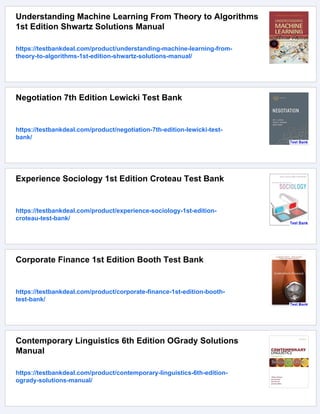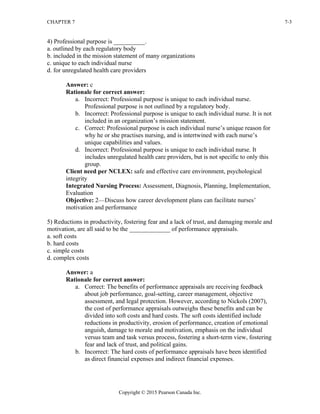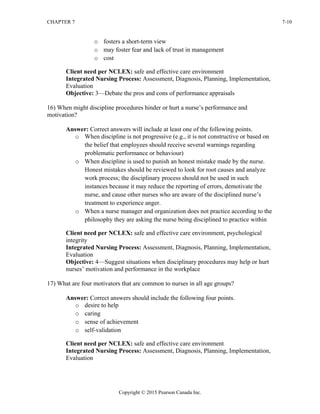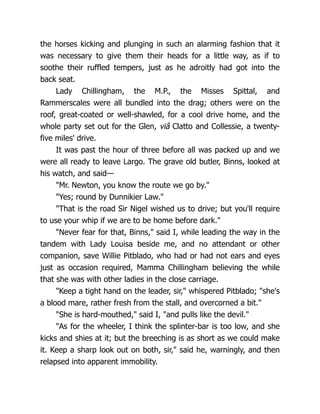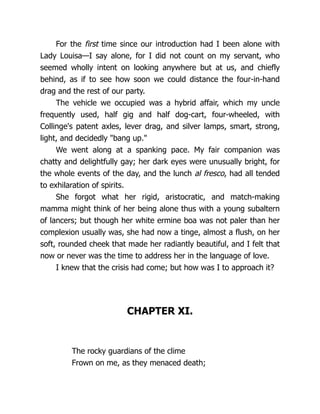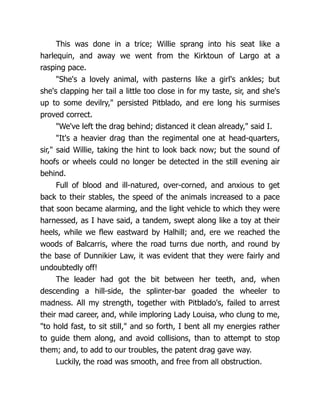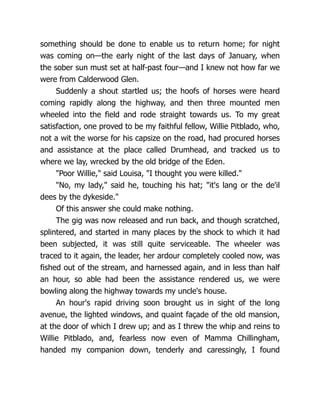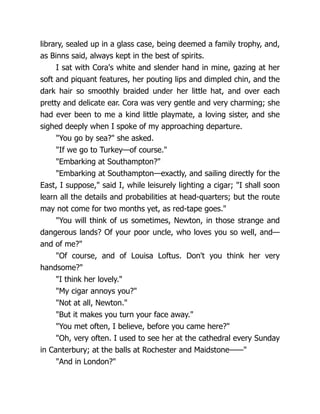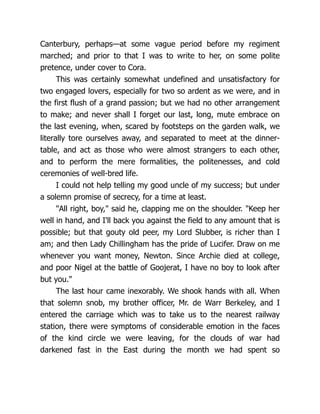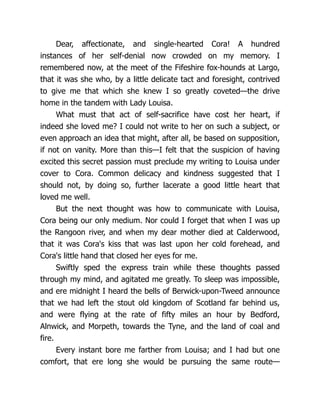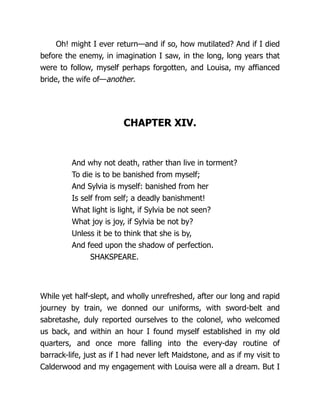Latest Canadian Nursing Leadership and Management 1st Edition Gaudine Test Bank
- 1. Latest Canadian Nursing Leadership and Management 1st Edition Gaudine Test Bank download https://testbankdeal.com/product/latest-canadian-nursing- leadership-and-management-1st-edition-gaudine-test-bank/ Explore and download more test bank or solution manual at testbankdeal.com
- 2. We have selected some products that you may be interested in Click the link to download now or visit testbankdeal.com for more options!. Nursing Leadership and Management Canadian 3rd Edition Patricia Test Bank https://testbankdeal.com/product/nursing-leadership-and-management- canadian-3rd-edition-patricia-test-bank/ Nursing Leadership and Management 2nd Edition Kelly Test Bank https://testbankdeal.com/product/nursing-leadership-and- management-2nd-edition-kelly-test-bank/ Nursing Leadership and Management 3rd Edition Patricia Test Bank https://testbankdeal.com/product/nursing-leadership-and- management-3rd-edition-patricia-test-bank/ Western Civilization Beyond Boundaries Volume I to 1715 7th Edition Noble Solutions Manual https://testbankdeal.com/product/western-civilization-beyond- boundaries-volume-i-to-1715-7th-edition-noble-solutions-manual/
- 3. Understanding Machine Learning From Theory to Algorithms 1st Edition Shwartz Solutions Manual https://testbankdeal.com/product/understanding-machine-learning-from- theory-to-algorithms-1st-edition-shwartz-solutions-manual/ Negotiation 7th Edition Lewicki Test Bank https://testbankdeal.com/product/negotiation-7th-edition-lewicki-test- bank/ Experience Sociology 1st Edition Croteau Test Bank https://testbankdeal.com/product/experience-sociology-1st-edition- croteau-test-bank/ Corporate Finance 1st Edition Booth Test Bank https://testbankdeal.com/product/corporate-finance-1st-edition-booth- test-bank/ Contemporary Linguistics 6th Edition OGrady Solutions Manual https://testbankdeal.com/product/contemporary-linguistics-6th-edition- ogrady-solutions-manual/
- 4. Systems Analysis and Design 10th Edition Shelly Solutions Manual https://testbankdeal.com/product/systems-analysis-and-design-10th- edition-shelly-solutions-manual/
- 5. CHAPTER 7 7-1 Copyright © 2015 Pearson Canada Inc. Multiple Choice Questions 1) Bonnie has been a nurse on a medical-surgical unit for 6 months. Recently, there has been mention of cutbacks in the hospital and she is sure she will be one of the nurses who will be let go. She has been finding it increasingly difficult to find motivation to go to work. This is an example of which theory of motivation? a. social cognitive theory b. Maslow’s hierarchy of needs c. Herzberg’s motivation-hygiene theory d. McClelland’s theory Answer: b Rationale for correct answer: a. Incorrect: Incorrect: In social cognitive theory, self-efficacy is an important component, and is defined as the degree of confidence an individual has that he or she can do a particular task. Job security is not a motivating factor in this theory. b. Correct: Correct. Maslow’s hierarchy of needs includes physiological, safety, belonging (love), self-esteem, and self-actualization needs. According to the safety tier of this theory, a person cannot feel motivated in their job if they feel it is not secure. c. Incorrect: Incorrect. In Hertzberg’s theory, the motivation factors are personal achievement, status, recognition, challenging work, responsibility, and advancement opportunities. Job security is not a motivating factor in this theory. d. Incorrect: Incorrect: McClelland’s theory deals with the need for achievement, affiliation, and power, and motivation is tied to whether or not a nurse is able to influence others, work on a team where he or she is liked and feels part of the group, and where success is achieved through recognition of achievement. Job security is not a motivating factor in this theory. Client need per NCLEX: safe and effective care environment, psychological integrity Integrated Nursing Process: Assessment, Diagnosis, Planning, Implementation, Evaluation Objective: 1—Analyze how different theories of work motivation can be applied to the motivation of nurses in the workplace 2) Personal achievement, status, policies and administration, work/life balance, and interpersonal relationships are all aspects of which motivation theory? a. social cognitive theory b. Maslow’s hierarchy of needs c. Herzberg’s motivation-hygiene theory d. McClelland’s theory
- 6. CHAPTER 7 7-2 Copyright © 2015 Pearson Canada Inc. Answer: c Rationale for correct answer: a. Incorrect: The motivating needs that must be met according to social cognitive theory are self-efficacy, cognitive factors, and behavioural factors. b. Incorrect: Maslow’s eight-stage needs hierarchy does not include these categories. c. Correct: Personal achievement, status, policies and administration, work/life balance, and interpersonal relationships are all needs that need to met within Herzberg’s motivation-hygiene theory. d. Incorrect: McClelland’s theory deals with the need for achievement, affiliation, and power. Client need per NCLEX: safe and effective care environment, psychological integrity Integrated Nursing Process: Assessment, Diagnosis, Planning, Implementation, Evaluation Objective: 1—Analyze how different theories of work motivation can be applied to the motivation of nurses in the workplace 3) Which of the following is true of the clinical ladders used by health care organizations to motivate and reward the performance of nurses? a. They are based on salary alone. b. They vary among organizations in terms of the number and type of steps included. c. They are professional purpose statements. d. They are not supported by the International Council of Nurses (ICN). Answer: b Rationale for correct answer: a. Incorrect: Clinical ladders include various components, such as job title and nursing role, and may or may not include a salary scale range. b. Correct: Clinical ladders enable nurses to progress in their career while remaining in direct patient care positions. New nurses start at the first step on the ladder and are promoted to subsequent steps as they gain expertise. However, there is variation among health care organizations in the number of steps on the ladder, the position titles for each step, and whether there is a different salary scale for each step. c. Incorrect: Clinical ladders do not include professional purpose statements. d. Incorrect: The ICN has supported the use of clinical ladders to promote nurses who work in direct care. Client need per NCLEX: safe and effective care environment Integrated Nursing Process: Assessment, Diagnosis, Planning, Implementation, Evaluation Objective: 2—Discuss how career development plans can facilitate nurses’ motivation and performance
- 7. CHAPTER 7 7-3 Copyright © 2015 Pearson Canada Inc. 4) Professional purpose is __________. a. outlined by each regulatory body b. included in the mission statement of many organizations c. unique to each individual nurse d. for unregulated health care providers Answer: c Rationale for correct answer: a. Incorrect: Professional purpose is unique to each individual nurse. Professional purpose is not outlined by a regulatory body. b. Incorrect: Professional purpose is unique to each individual nurse. It is not included in an organization’s mission statement. c. Correct: Professional purpose is each individual nurse’s unique reason for why he or she practises nursing, and is intertwined with each nurse’s unique capabilities and values. d. Incorrect: Professional purpose is unique to each individual nurse. It includes unregulated health care providers, but is not specific to only this group. Client need per NCLEX: safe and effective care environment, psychological integrity Integrated Nursing Process: Assessment, Diagnosis, Planning, Implementation, Evaluation Objective: 2—Discuss how career development plans can facilitate nurses’ motivation and performance 5) Reductions in productivity, fostering fear and a lack of trust, and damaging morale and motivation, are all said to be the _____________ of performance appraisals. a. soft costs b. hard costs c. simple costs d. complex costs Answer: a Rationale for correct answer: a. Correct: The benefits of performance appraisals are receiving feedback about job performance, goal-setting, career management, objective assessment, and legal protection. However, according to Nickols (2007), the cost of performance appraisals outweighs these benefits and can be divided into soft costs and hard costs. The soft costs identified include reductions in productivity, erosion of performance, creation of emotional anguish, damage to morale and motivation, emphasis on the individual versus team and task versus process, fostering a short-term view, fostering fear and lack of trust, and political gains. b. Incorrect: The hard costs of performance appraisals have been identified as direct financial expenses and indirect financial expenses.
- 8. CHAPTER 7 7-4 Copyright © 2015 Pearson Canada Inc. c. Incorrect: Simple costs were not identified by Nickols (2007) as costs of the performance appraisal process. d. Incorrect: Complex costs were not identified by Nickols (2007) as costs of the performance appraisal process. Client need per NCLEX: safe and effective care environment Integrated Nursing Process: Assessment, Diagnosis, Planning, Implementation, Evaluation Objective: 3—Debate the pros and cons of performance appraisals 6) Performance appraisals are considered to have the following positive impacts on employees: a. goal setting, career management, and reductions in productivity. b. legal protection, objective assessment, and feedback. c. rewarding the team, career management, and feedback. d. a long-term goal, career management, and goal setting. Answer: b Rationale for correct answer: a. Incorrect: Reduction in productivity is considered to be a negative impact of performance appraisals, not a positive one. b. Correct: The benefits of performance appraisals are receiving feedback about job performance, goal-setting, career management, objective assessment, and legal protection. c. Incorrect: One of the negative impacts of performance appraisals is that they reward the individual rather than rewarding the team. d. Incorrect: One of the negative impacts of performance appraisals is that they foster short-term goals rather than long-term goals. Client need per NCLEX: safe and effective care environment Integrated Nursing Process: Assessment, Diagnosis, Planning, Implementation, Evaluation Objective: 3—Debate the pros and cons of performance appraisals 7) Consider each of the following situations. In which one would the use of progressive discipline not be appropriate? a. when a nurse assaults a patient b. when a medication error is made c. when a second medication error is made d. when a patient makes a complaint about a nurse’s behaviour Answer: a Rationale for correct answer: a. Correct: Progressive discipline is a contracture approach to discipline that is based on the belief that employees should receive several warnings regarding their performance or behaviour if it is problematic. It is based on a manager’s belief that employees can learn, develop, and change. However, in cases where the nurse’s action is extreme, such as stealing
- 9. CHAPTER 7 7-5 Copyright © 2015 Pearson Canada Inc. narcotics or intentionally harming a patient, progressive discipline would not be used, and instead the nurse might be terminated or put on paid leave until an investigation is completed. b. Incorrect: Medication errors are a situation where progressive discipline would be appropriate. c. Incorrect: A second occurrence of a medication error is a situation where progressive discipline would be appropriate. d. Incorrect: A patient complaining about a nurse’s behaviour is a situation where progressive discipline would be appropriate. Client need per NCLEX: safe and effective care environment, psychological integrity Integrated Nursing Process: Assessment, Diagnosis, Planning, Implementation, Evaluation Objective: 4—Suggest situations when disciplinary procedures may help or hurt nurses’ motivation and performance in the workplace 8) Honest mistakes should be reviewed in order to __________. a. build a case for disciplinary action against a nurse b. look for the root cause and analyze work processes c. penalize nurses who are forgetful d. discipline nurses who do not perform according to unit policy Answer: b Rationale for correct answer: a. Incorrect: The disciplinary process should not be used for nurses who make an honest mistake. Using discipline in cases where nurses make honest mistakes may reduce the reporting of errors, as well as demotivate the nurse and cause all nurses who are aware of the nurse’s treatment to experience anger. b. Correct: The disciplinary process should not be used for nurses who make an honest mistake. Honest mistakes should instead be reviewed to look for root causes and analyze work processes to see how they can be improved to reduce errors. c. Incorrect: The disciplinary process should not be used for nurses who make an honest mistake. Using discipline in cases where nurses make honest mistakes may reduce the reporting of errors, as well as demotivate the nurse and cause all nurses who are aware of the nurse’s treatment to experience anger. d. Incorrect: The disciplinary process should not be used for nurses who make an honest mistake. Using discipline in cases where nurses make honest mistakes may reduce the reporting of errors, as well as demotivate the nurse and cause all nurses who are aware of the nurse’s treatment to experience anger. Client need per NCLEX: safe and effective care environment, psychological integrity
- 10. CHAPTER 7 7-6 Copyright © 2015 Pearson Canada Inc. Integrated Nursing Process: Assessment, Diagnosis, Planning, Implementation, Evaluation Objective: 4—Suggest situations when disciplinary procedures may help or hurt nurses’ motivation and performance in the workplace 9) While nexters and baby boomers differ in many ways, there are some similarities in what motivates both groups in the workplace. These similarities include __________. a. desire to help, caring, and salary b. desire to help, caring, and scheduled time off c. desire to help, caring, and sense of achievement d. salary, caring, and self-validation Answer: c a. Incorrect: Salary was not a factor that was motivating to nurses across different age groups. b. Incorrect: Scheduled time off was not identified as a factor that was motivating across different age groups in the workplace. Time off was has been identified as a motivating factor specifically for Generation X employees. c. Correct: Similarities in what motivates both nexters and baby boomers in the workplace include the desire to help, caring, a sense of achievement, and self-validation. d. Incorrect: Salary and self-validation are not factors that were identified as motivating to nurses across different age groups. Rationale for correct answer: Client need per NCLEX: safe and effective care environment, psychological integrity Integrated Nursing Process: Assessment, Diagnosis, Planning, Implementation, Evaluation Objective: 5—Identify how nexters, members of Generation X, and nurses nearing retirement (baby boomers) may differ in what motivates them in the workplace 10) It has been a busy night in the emergency room and there is now a trauma patient coming in. Given what you know about the differences among generations of nurses, which of the following would you expect to volunteer to participate in the care of the trauma patient? a. Marnie, aged 55 b. John, aged 28 c. Elizabeth, aged 42 d. Marilyn, aged 36 Answer: b a. Incorrect: Research by Newton et al (2009) found that nurses 30 years of age or younger were more motivated by exciting and challenging work situations than nurses aged 40 to 50 years.
- 11. CHAPTER 7 7-7 Copyright © 2015 Pearson Canada Inc. b. Correct: Research by Newton et al (2009) found that nurses 30 years of age or younger were more motivated by exciting and challenging work situations than nurses aged 40 to 50 years. c. Incorrect: Research by Newton et al (2009) found that nurses 30 years of age or younger were more motivated by exciting and challenging work situations than nurses aged 40 to 50 years. d. Incorrect: Research by Newton et al (2009) found that nurses 30 years of age or younger were more motivated by exciting and challenging work situations than nurses aged 40 to 50 years. Rationale for correct answer: Client need per NCLEX: safe and effective care environment Integrated Nursing Process: Assessment, Diagnosis, Planning, Implementation, Evaluation Objective: 5—Identify how nexters, members of Generation X, and nurses nearing retirement (baby boomers) may differ in what motivates them in the workplace 11) In which type of workplace would a nurse be more motivated to practice? a. where there is a high level of autonomy b. where there is no apparent collaboration among team members c. where there are few opportunities to learn d. where there are definite hierarchical relationships among the team Answer: a Rationale for correct answer: a. Correct: A review by Toode et al (2011) identified studies that showed nurses were more motivated by good collaboration with other members of the health care team, social support within the team, positive team spirit, being an equally valued member of the team, high autonomy, a variety of different work-related activities, manual work, opportunities to learn, opportunities to share their knowledge with physicians, and receiving supervision. b. Incorrect: Nurses are motivated by collaboration with other team members. A lack of collaboration would be demotivating. c. Incorrect: Nurses are motivated by having opportunities to learn. A lack of opportunities would be demotivating. d. Incorrect: Nurses are motivated by being an equally valued member of the team and having a high degree of autonomy. Working within a definite hierarchical relationship would be demotivating. Client need per NCLEX: safe and effective work environment, psychological integrity Integrated Nursing Process: Assessment, Diagnosis, Planning, Implementation, Evaluation Objective: 6—Relate issues related to motivation and performance to your practice setting(s)
- 12. CHAPTER 7 7-8 Copyright © 2015 Pearson Canada Inc. 12) How will performance be affected by setting objectives that can be easily achieved? a. It will be eroded. b. It will improve. c. It will lead to increased motivation. d. It will eliminate the need for performance appraisals. Answer: a Rationale for correct answer: a. Correct: Erosion of performance might occur if employees are given objectives that they can easily achieve. b. Incorrect: If objectives are too easy to achieve, performance will be eroded, not improved. c. Incorrect: If objectives are too easy to achieve, motivation will decrease, not increase. d. Incorrect: Performance appraisals are required, regardless of performance erosion/motivation. Client need per NCLEX: safe and effective care environment Integrated Nursing Process: Assessment, Diagnosis, Planning, Implementation, Evaluation Objective: 6—Relate issues related to motivation and performance to your practice setting(s) Short Answer Questions 13) Name three motivation factors and three hygiene factors in Herzberg’s motivation- hygiene theory. Answer: Correct answers should include three points from each of the following categories: o Motivation factors: personal achievement, status, recognition, challenging work, responsibility, advancement opportunities o Hygiene factors: salaries and benefits, employer policies and administration, interpersonal relationships, supervision, job security, working conditions, work/life balance Client need per NCLEX: safe and effective care environment Integrated Nursing Process: Assessment, Diagnosis, Planning, Implementation, Evaluation Objective: 1—Analyze how different theories of work motivation can be applied to the motivation of nurses in the workplace
- 13. CHAPTER 7 7-9 Copyright © 2015 Pearson Canada Inc. 14) Discuss how a professional purpose statement can facilitate a nurse’s motivation and performance. Answer: Correct answers should include some of the following points. o Professional purpose statements involve nurses in writing their view of their own professional purpose and values. o Through reflection and articulating their purpose and values, nurses can increase their motivation to fulfill their desired purposes and act in accordance with their professional values o Professional purpose is each individual nurse’s unique reason for practising nursing and is intertwined with each nurse’s unique capabilities and values. The nurse’s reason for choosing to become a nurse and to continue to practise are articulated, and help motivate the nurse to direct his or her practice and self-development in congruence with his or her professional purpose. o In challenging clinical or workplace situations, reflecting on your professional purpose statements can help guide your decisions and behaviours, enabling you to be the type of nurse you want to be. Client need per NCLEX: safe and effective care environment Integrated Nursing Process: Assessment, Diagnosis, Planning, Implementation, Evaluation Objective: 2—Discuss how career development plans can facilitate nurses’ motivation and performance 15) Discuss four pros and four cons of performance appraisals Answer: Correct answers will include four points from each of the following categories. o Pros: o use of self-reflection may be mandated by regulatory body o feedback o goal setting o career management o objective assessment o legal protection o facilitates communication between nurse manager and health care worker o Cons: o time-consuming o may focus on brief encounters o reductions in productivity o rewards the individual, not the team
- 14. CHAPTER 7 7-10 Copyright © 2015 Pearson Canada Inc. o fosters a short-term view o may foster fear and lack of trust in management o cost Client need per NCLEX: safe and effective care environment Integrated Nursing Process: Assessment, Diagnosis, Planning, Implementation, Evaluation Objective: 3—Debate the pros and cons of performance appraisals 16) When might discipline procedures hinder or hurt a nurse’s performance and motivation? Answer: Correct answers will include at least one of the following points. o When discipline is not progressive (e.g., it is not constructive or based on the belief that employees should receive several warnings regarding problematic performance or behaviour) o When discipline is used to punish an honest mistake made by the nurse. Honest mistakes should be reviewed to look for root causes and analyze work process; the disciplinary process should not be used in such instances because it may reduce the reporting of errors, demotivate the nurse, and cause other nurses who are aware of the disciplined nurse’s treatment to experience anger. o When a nurse manager and organization does not practice according to the philosophy they are asking the nurse being disciplined to practice within Client need per NCLEX: safe and effective care environment, psychological integrity Integrated Nursing Process: Assessment, Diagnosis, Planning, Implementation, Evaluation Objective: 4—Suggest situations when disciplinary procedures may help or hurt nurses’ motivation and performance in the workplace 17) What are four motivators that are common to nurses in all age groups? Answer: Correct answers should include the following four points. o desire to help o caring o sense of achievement o self-validation Client need per NCLEX: safe and effective care environment Integrated Nursing Process: Assessment, Diagnosis, Planning, Implementation, Evaluation
- 15. Visit https://testbankdead.com now to explore a rich collection of testbank, solution manual and enjoy exciting offers!
- 16. CHAPTER 7 7-11 Copyright © 2015 Pearson Canada Inc. Objective: 5—Identify how nexters, members of Generation X, and nurses nearing retirement (baby boomers) may differ in what motivates them in the workplace 18) Select three motivators from the following list that you have witnessed in your workplace. Describe their effect on your own motivation and/or performance. a. good collaboration with other members of the health care team b. social support within the team c. positive team spirit d. being an equally valued member of the team e. high autonomy f. variety of different work-related activities g. manual work h. opportunities to learn i. opportunities to share knowledge with physicians Answer: Responses will vary according to personal experience. Client need per NCLEX: safe and effective care environment Integrated Nursing Process: Assessment, Diagnosis, Planning, Implementation, Evaluation Objective: 6—Relate issues related to motivation and performance to your practice setting(s)
- 17. Other documents randomly have different content
- 18. a dainty little phaeton, in which the general was to drive Cora and Miss Wilford, drawn by two of the sleekest, roundest, and sauciest little ponies that ever came out of Ultima Thule. I was to drive the drag to the meet; and, after the hunt, Berkeley was to meet us at a certain point on the Cupar Road, and drive the vehicle home, if I felt disposed to yield the ribbons to him, which I had quite resolved to do. Of the noise and excitement, the spurring, yelping, and hallooing, sounding of horns, and cracking of whips; the greetings of rough and boisterous country friends; the criticisms that ensued on dogs, horses, and harness; of how the cover was drawn, and the fox broke away; how huntsmen and hounds followed "owre bank, bush, and scaur," as if the devil had got loose, and life depended on his instant re-capture, and of all the incidents of the hunt, I need give no relation here. The afternoon was well-nigh spent before we saw the last of my uncle's companions; and to the luncheon provided by Mr. Binns we had done full justice, the roof of the drag being covered by a white cloth, and improvised as a dining-table, whereon was spread a déjeûner service of splendid Wedgwood ware, the champagne sparkling in the sun, and the long glasses of potash and Beaujolais foaming up for the thirsty; and Largo Law, a green and conical hill, verdant to its summit a thousand feet above the waters of the bay, was throwing its shadow to the eastward, when we made arrangements for our return; and, thanks to dear Cora's tact and management, rather than my own—for timidity and doubt embarrassed me—I contrived to get Lady Louisa into the tandem. After which, by giving a hint to Willie Pitblado, he managed to set
- 19. the horses kicking and plunging in such an alarming fashion that it was necessary to give them their heads for a little way, as if to soothe their ruffled tempers, just as he adroitly had got into the back seat. Lady Chillingham, the M.P., the Misses Spittal, and Rammerscales were all bundled into the drag; others were on the roof, great-coated or well-shawled, for a cool drive home, and the whole party set out for the Glen, viâ Clatto and Collessie, a twenty- five miles' drive. It was past the hour of three before all was packed up and we were all ready to leave Largo. The grave old butler, Binns, looked at his watch, and said— "Mr. Newton, you know the route we go by." "Yes; round by Dunnikier Law." "That is the road Sir Nigel wished us to drive; but you'll require to use your whip if we are to be home before dark." "Never fear for that, Binns," said I, while leading the way in the tandem with Lady Louisa beside me, and no attendant or other companion, save Willie Pitblado, who had or had not ears and eyes just as occasion required, Mamma Chillingham believing the while that she was with other ladies in the close carriage. "Keep a tight hand on the leader, sir," whispered Pitblado; "she's a blood mare, rather fresh from the stall, and overcorned a bit." "She is hard-mouthed," said I, "and pulls like the devil." "As for the wheeler, I think the splinter-bar is too low, and she kicks and shies at it; but the breeching is as short as we could make it. Keep a sharp look out on both, sir," said he, warningly, and then relapsed into apparent immobility.
- 20. For the first time since our introduction had I been alone with Lady Louisa—I say alone, for I did not count on my servant, who seemed wholly intent on looking anywhere but at us, and chiefly behind, as if to see how soon we could distance the four-in-hand drag and the rest of our party. The vehicle we occupied was a hybrid affair, which my uncle frequently used, half gig and half dog-cart, four-wheeled, with Collinge's patent axles, lever drag, and silver lamps, smart, strong, light, and decidedly "bang up." We went along at a spanking pace. My fair companion was chatty and delightfully gay; her dark eyes were unusually bright, for the whole events of the day, and the lunch al fresco, had all tended to exhilaration of spirits. She forgot what her rigid, aristocratic, and match-making mamma might think of her being alone thus with a young subaltern of lancers; but though her white ermine boa was not paler than her complexion usually was, she had now a tinge, almost a flush, on her soft, rounded cheek that made her radiantly beautiful, and I felt that now or never was the time to address her in the language of love. I knew that the crisis had come; but how was I to approach it? CHAPTER XI. The rocky guardians of the clime Frown on me, as they menaced death;
- 21. While echoing still in measured time The gallop of my courser's hoof, They hoarsely bid me stand aloof. Where goest thou, madman? Where no shade Of tree or tent shall screen thy head. Still on—still on; I turn my eyes— The cliffs no longer mock the skies: The peaks shrink back, and hide their brow, Each other's lofty peaks below. FROM THE POETRY OF MICKIEWICZ. As if inspired by fortune, or my good genius, Lady Louisa began thus, in a low voice— "By the way, Mr. Norcliff, you were to have shown me the house in which Alexander Selkirk—or Robinson Crusoe—was born in 1676, I think you said?" "Oh; it is only a cottage, consisting of one storey and a garret; but the next time we come to Largo, I shall show you his flip-can, musket, and a lock of his hair." "Ah, that reminds me, Mr. Norcliff, that you must return to me the lock of hair which you obtained when inspired with romance by Miss Calderwood's legend last night." "Lady Louisa, I implore your permission to retain it," said I, in a low voice. "To what end, or for what reason?" she asked, with a furtive smile.
- 22. "I am going far, far away, and it will serve as a memento of many happy days, and of one whom I shall never cease to remember, but with——" "Why, you don't mean to say that—that you are serious?" she asked, in a voice that betrayed emotion, while my heart rose to my trembling lips, and I turned to gaze upon her with an unmistakable expression of love and tenderness, which made her colour come and go visibly. Reassuring herself, she began to smile. "Perhaps your creed is a soldier's one?" said she, with a little convulsive laugh, as she tied her veil under her chin. "A soldier's! I hope so; but in what sense do you mean?" "'To love all that is lovely, and all that you can,' as the song has it." I laid a hand lightly on her soft arm, and was about to say something there could be no misconstruing, while a film seemed to pass over my eyes, and my soul rose to my lips; but Pitblado, who, whether he was listening or not, had a sharp eye on the cattle, now said— "Beg your pardon, sir, but I don't like the look of that leader." "The blood mare with the white star on her forehead," said I, touching her lightly on the flank with the whip, and making her curvet; "she is usually very quiet." "Perhaps so, sir; but she's always clapping her ears close down —throwing her eyes backward, and showing the whites. She's up to mischief, I'm certain." "Jump down, then," said I, "shorten the curb, and lengthen the traces by a hole or two."
- 23. This was done in a trice; Willie sprang into his seat like a harlequin, and away we went from the Kirktoun of Largo at a rasping pace. "She's a lovely animal, with pasterns like a girl's ankles; but she's clapping her tail a little too close in for my taste, sir, and she's up to some devilry," persisted Pitblado, and ere long his surmises proved correct. "We've left the drag behind; distanced it clean already," said I. "It's a heavier drag than the regimental one at head-quarters, sir," said Willie, taking the hint to look back now; but the sound of hoofs or wheels could no longer be detected in the still evening air behind. Full of blood and ill-natured, over-corned, and anxious to get back to their stables, the speed of the animals increased to a pace that soon became alarming, and the light vehicle to which they were harnessed, as I have said, a tandem, swept along like a toy at their heels, while we flew eastward by Halhill; and, ere we reached the woods of Balcarris, where the road turns due north, and round by the base of Dunnikier Law, it was evident that they were fairly and undoubtedly off! The leader had got the bit between her teeth, and, when descending a hill-side, the splinter-bar goaded the wheeler to madness. All my strength, together with Pitblado's, failed to arrest their mad career, and, while imploring Lady Louisa, who clung to me, "to hold fast, to sit still," and so forth, I bent all my energies rather to guide them along, and avoid collisions, than to attempt to stop them; and, to add to our troubles, the patent drag gave way. Luckily, the road was smooth, and free from all obstruction.
- 24. "To the left, sir—to the left," shouted Pitblado, as we came to a place where two roads branched off; "that is Drumhead. Our way lies due west." Pitblado might as well have shouted to the wind; the infuriated brutes took their own way, and tore at an awful pace due north. Horses pasturing by the wayside trotted to the rear, and sheep browsing in the fields fled at our approach; cattle kicked up their heels, and scampered away in herds. House-dogs barked, terriers yelled, and pursued us open-mouthed; children, ducks, cocks, and hens fled from the village gutters; peasants, at their cottage doors, held up their hands, with shouts of fear, while broad fields and lines of leafless trees, turf dykes, and hedges, drains, and thatched dwellings seemed all to fly past with railway speed, or to be revolving in a circle round us. A shriek of commiseration burst from my affrighted companion, when, just as we swept past the base of Drumcarra Craig, in the cold, bleak, and elevated district of Cameron, poor Willie Pitblado, who had risen to give me the assistance of his hands in bearing on the reins, or for the last time to try and let down the faulty drag, fell out behind, and vanished in a moment. And now before us spread Magus Muir, where the graves of Archbishop Sharpe's murderers lie in a field that has never been ploughed even unto this day. Twilight had come on, and a brilliant aurora, forming great pillars of variegated light, that shot upward and downward from the horizon to the dome of heaven, filled all the northern quarter of the sky with singular but many masses of streamers. Thus, the brilliance of the atmosphere cast forward in strong and black outline the range of hills that bound the Howe of Fife, and terminate the valley
- 25. through which the Ceres flows to join the Eden; and all this, I think, conduced to add to the terror of the horses. Pitblado's fate greatly alarmed and concerned me, for he was a brave, handsome, and faithful fellow, and an old acquaintance; but I had another—a nearer, dearer—and more intense source of anxiety. If she who sat beside me, clinging to me, and embracing my left arm with all her energy—she whom I loved so deeply, and whom I had lured into the tandem, when she might have been safely in the drag or carriage, should lose her life that night, of what value would my future existence be, embittered with such a terrible reflection? "If a linchpin comes loose, or a trace gives way," thought I, "all will be over with us both." "Oh, Mr. Norcliff, Mr. Norcliff!" she exclaimed, while the tears, which she had no means of wiping away, streamed over her pale and beautiful face, and while her head half-reclined on my shoulder. "Heaven help us, this is terrible—most terrible! We shall certainly be killed!" "Then I hope it shall be together," I exclaimed. "Lady Loftus— dear Lady Loftus—dearest Louisa (here was a jump) trust to me, and me only! (what stuff men will talk; who else could she trust to?) and if it is in the power of humanity to save you, you shall be saved, or I shall die with you. Louisa, oh, Louisa, hear me. I would not—I could not survive you; but—but sit still, sit close, grasp me and hold on for Heaven's sake. (D—n that leader!) Oh, Louisa, I love you, love you dearly and devotedly. You must believe me when I say it at a time like this; when death, perhaps, is staring us face to face. Speak to me, dearest!"
- 26. I felt that the day, the hour, the moment of destiny had come; that time of joy or sorrow forever, and casting all upon it, committing the reins to my right hand, I threw my left arm round her, and pressing her to my breast, told her again and again how fondly I loved her, while still our mad steeds tore on. "I know that you love me, Mr. Norcliff," she said, in a low and agitated voice, as her constitutional self-possession returned. "I have long seen it—felt it." "My adorable Louisa!" "And I will not—will not——" She paused, painfully. "What? Oh, speak." "Deny that I love you in return." "Heaven bless you, my darling, for saying so; for lifting a load of anxiety from my heart, and for making me so happy," I whispered, making an effectual effort to kiss her forehead. "But then, Mr. Norcliff——" "Alas! yes; but what?" "There is mamma; you know, perhaps, her views concerning me —ambitious views; but we must take another time, if Heaven spares, to talk of that matter." "What time so good as this?" I exclaimed impetuously, as we tore along, and Magus Muir, the Bishop's Wood, and Gullane's gravestone were left behind. "Poor me, a lieutenant of the lancers; and the earl, your father." "Oh, dear papa—good, easy man—I don't think he troubles his head much in the affair; but if mamma knew all this, such a violation of her standing orders, heaven help us!"
- 27. She could almost have laughed but for the peril on which we were rushing, and a shrill little cry escaped her, as the leader suddenly quitted the hard highway, and, followed by the wheeler, passed throughan open field gate, and continued at the same frightful speed across a large space of pasture land that sloped steeply down to where my forebodings told me the Eden lay, and there, sure enough, in less than a minute, we could see the river rolling among the copsewood, with its waters swollen by the snows that had recently melted among the Lomond hills. Though a placid stream usually, and having a pretty level course, in that quarter the banks were rugged, and the bed full of fallen larches and large boulder stones. If the vehicle overturned, what might be the fate of her who had just acknowledged that she loved me? A prayer—almost a solemn invocation—rose to my lips, when, with the rapidity of light, the thought occurred to me of heading the leader towards a little stone bridge that spanned the stream. It was a mere narrow footway for shepherds, sheep, and cattle, and not of sufficient breadth to permit the passage of a four-wheeled gig; but I knew that if the latter could be successfully jammed between the walls, the course of the runaways would be arrested. There was no alternative between attempting this and risking death from drowning or mutilation in the rugged bed of the swollen stream. Down the steep grassy slope our foam-covered cattle rushed straight for the narrow bridge; I grasped the rail of the seat with one hand and arm; the other was round Louisa, lest the coming shock might throw us off. In an instant we felt it, and she clung to me,
- 28. half-fainting, as there was a terrible crash, a ripping and splitting sound, as wood was smashed and harness rent. Our course was arrested—the wheels and axle of the fore-carriage wedged between the stone walls of the narrow bridge, the wheeler kicking furiously at the splinter-bar and splash-board, and the leader, the blood mare, the source of all the mischief, hanging over the parapet in the stream, snorting, half-swimming, and for ought I cared, wholly hanging. My first thought was my companion. We both trembled in every limb as I lifted her gently to the ground, and placed the seat- cushions on a stone, where she might sit and compose herself till I considered what we should do next, and where we were. She was greatly agitated, but passively permitted me to encircle her with my arms, to assure her that she was safe, to press her hands, and to wipe away her tears caressingly. I forgot all about poor Pitblado, "spilt" on the road, all about my uncle's best blood mare hanging in the traces, and all about the half-ruined gig. In short, I felt only the most exquisite joy that I had gained, as it were, life and Louisa together. It was that moment of intense rapture, when, combined with the natural revulsion of feeling consequent to escape from a deadly peril, I enjoyed that emotion which a man feels once, and once only, in a lifetime, when the first woman he loves confesses to a mutual regard; and, half-kneeling, I stooped over her, kissing her again and again, assuring her—of I know not what. From one of her fingers I transferred to mine a ring of small value—a pearl set in blue enamel, leaving in its place a rose diamond. It was a beautiful stone, of the purest water, which I had
- 29. found when our troops sacked the great pagoda at Rangoon, and I had it set at Calcutta by a jeweller, who assured me that it was worth nine hundred rupees, or ninety pounds, and I only regretted now that it was not worth ten times as much, to be truly worthy of the slender finger on which I placed it. She regarded me with a loving smile on her pale face, and in the quiet depths of her soft dark eyes, as she reclined in my arms. I gazed on her with emotions of the purest rapture. She was now humbled, gentle and loving—this brilliant beauty, this proud earl's daughter—mine, indeed—all that a man could dream of as perfection in a woman or as a wife; at least, I thought so then; and I was not a little proud of the idea of what our mess would say—the colonel, Studhome, Scriven, Wilford, Berkeley, and the rest—of a marriage that would certainly be creditable to the regiment, though we had titles and honourables enough in the lancers; and already, in fancy, I saw myself "tooling" into Maidstone barrack-square in a dashing phaeton, with a pair of cream-coloured ponies, with Norcliff and Loftus quartered on the panels, and silver harness, and Louisa by my side, in one of the most perfect of morning toilettes and of marriage bonnets that London millinery could produce. Poor devil! with only two hundred per annum besides my pay, and the war before me, I was thus acquiring castles in Airshire, and estates in the Isle of Sky. Oblivious of time, while the woods and hills of Dairsie were darkening against the sky, while the murmuring Eden flowed past towards the Tay, and the ever-changing spears and streamers of the northern aurora were growing brighter and more bright, I remained by the side of Louisa, wholly entranced, and only half-conscious that
- 30. something should be done to enable us to return home; for night was coming on—the early night of the last days of January, when the sober sun must set at half-past four—and I knew not how far we were from Calderwood Glen. Suddenly a shout startled us; the hoofs of horses were heard coming rapidly along the highway, and then three mounted men wheeled into the field and rode straight towards us. To my great satisfaction, one proved to be my faithful fellow, Willie Pitblado, who, not a wit the worse for his capsize on the road, had procured horses and assistance at the place called Drumhead, and tracked us to where we lay, wrecked by the old bridge of the Eden. "Poor Willie," said Louisa, "I thought you were killed." "No, my lady," said he, touching his hat; "it's lang or the de'il dees by the dykeside." Of this answer she could make nothing. The gig was now released and run back, and though scratched, splintered, and started in many places by the shock to which it had been subjected, it was still quite serviceable. The wheeler was traced to it again, the leader, her ardour completely cooled now, was fished out of the stream, and harnessed again, and in less than half an hour, so able had been the assistance rendered us, we were bowling along the highway towards my uncle's house. An hour's rapid driving soon brought us in sight of the long avenue, the lighted windows, and quaint façade of the old mansion, at the door of which I drew up; and as I threw the whip and reins to Willie Pitblado, and, fearless now even of Mamma Chillingham, handed my companion down, tenderly and caressingly, I found
- 31. myself an engaged man, and the fiancé of one of the fairest women in Britain—the brilliant Louisa Loftus! CHAPTER XII. It passed—and never marble looked more pale Than Lucy, while she listened to his tale. He marked her not; his eye was cold and clear, Fixed on a bed of withering roses there; He marked her not, for different thoughts possessed His anxious mind, and laboured in his breast. ELLIS. Notwithstanding all that had passed, and that we had been carried so far in the wrong direction, we were not long behind the rest of our party in reaching Calderwood, where the history of our disaster fully eclipsed for the evening all the exciting details of the fox- hunters, though many gentlemen in scarlet, with spattered tops and tights, whom Sir Nigel had brought, made the drawing-room look unusually gay. Lady Louisa remained long in her own apartment; the time seemed an age to me; yet I was happy—supremely happy. I had a vague idea of the new emotions that served, perhaps, to detain her
- 32. there; but an air of cold reserve and unmistakable displeasure hovered on the forehead of her haughty mother. When Louisa joined us, she had perfectly recovered her usual equanimity and presence of mind—her calm, pale, and placid aspect. She was somewhat silent and reserved; this passed for her natural terror of the late accident, and though we remained some distance apart, her fine dark eyes sought mine, ever and anon, and were full of intelligent glances, that made my heart leap with joy. Cora, who shrewdly suspected that there had been more in the affair than what Berkeley called "a doocid spill," regarded us with interest, and with a tearful earnestness that surprised us, after our return, and during the explanation which we were pleased to make. But whatever tales my face told, Louisa's was unfathomable, so from its expression suspicious little Cora could gather nothing; though, had she carried her scrutiny a little further, she might have detected my famous Rangoon diamond sparkling on the engaged finger of her friend's left hand. Cora was on this night, to me, an enigma! What had gone wrong with her? When she smiled, it seemed to several—to me especially—that the kind little heart from whence these smiles were wrung was sick. Why was this, and what or who was the source of her taciturnity and secret sorrow?—not Berkeley, surely—they had come home in the drag together—she could never love such an ass as Berkeley; and if the fellow dared to trifle with her—but I thrust the thought aside, and resolved to trust the affair to her friend and gossip, the Lady Loftus. A few more days glided swiftly and joyously past at Calderwood Glen; we had no more riding and driving; but, as the weather was
- 33. singularly open and balmy for the season, we actually had more than one picnic in the leafless woods, and I betook me to the study of botany and arboriculture with the ladies. I enjoyed all the delicious charm of a successful first love! The last thought on going to repose; the first on waking in the morning; and the source of many a soft and happy dream between. The peculiarity, or partial disparity, of our positions in life caused secrecy. Denied, by the presence of others, the pleasure of openly conversing of our love, at times we had recourse to furtive glances, or a secret and thrilling pressure of the hand or arm was all we could achieve. Then there were sighs the deeper for suppression, And stolen glances sweeter for the theft; And burning blushes, though for no transgression, Tremblings when met, and restlessness when left. Small and trivial though these may seem, they proved the sum of our existence, and even of mighty interest, lighting up the eye and causing the pulses of the heart to quicken. We became full of petty and lover-like stratagems, and of enigmatical phrases, all the result of the difficulties that surrounded our intercourse when others were present—especially Lady Chillingham, who was by nature cold, haughty, and suspicious, with, I think, a natural born antipathy to subalterns of cavalry in particular. Cora saw through our little artifices, and Berkeley, that Anglo-Scotch snob of the nineteenth century, had ever his eyes remarkably wide
- 34. open to all that was going on around him, and thus the perils of discovery and instant separation were great, while our happy love was in the flush. This danger gave us a common sympathy, a united object, a delicious union of thought and impulse. Nor was romance wanting to add zest to the secrecy of our passion. Ah, were I to live a thousand years, never should I forget the days of happiness I spent in Calderwood Glen with Louisa Loftus. Our interviews had all the mystery of a conspiracy, though, save Cora, none as yet suspected our love; and there was a part of the garden, between two old yew hedges—so old that they had seen the Calderwoods of past ages cooing and billing, in powdered wigs and coats of mail, with dames in Scottish farthingales and red-heeled shoes—where, at certain hours, by a tacit understanding, we were sure of meeting; but with all the appearance of chance, though occasionally for a time so brief, that we could but exchange a pressure of the hand, or snatch a caress, perhaps a kiss, and then separate in opposite directions. Those were blessed and joyous interviews; memories to treasure and brood over with delight when alone. In the society of our friends, my heart throbbed wildly, when by a glance, a smile, a stolen touch of the hand, Louisa reminded me of what none else could perceive, the secret understanding that existed between us. And yet all this happiness was clouded by a sense of its brevity, and by our fears for the future; the obstacles that rank and great fortune on her side, the lack of both on mine, raised between us; and then there was the certain prospect of a long and dangerous— alas! it might prove, a final separation.
- 35. "They who love," writes an anonymous author, "must ever drink deeply of the cup of trembling; but, at times, there will arise in their hearts a nameless terror, a sickening anxiety for the future, whose brightness all depends upon this one cherished treasure, which often proves a foreboding of some real anguish looming in the distant hours." "Where is all this to end?" I asked of myself, as the conviction that something must be done forced itself upon me, for the happy days were passing, and my short leave of absence was drawing to a close. One day, by the absence of some of our friends, and by the occupation of others, we found ourselves alone, and permitted to have a longer interview than usual, in our yew-hedge walk, and we were conversing of the future. "I have two hundred a year besides my pay, Louisa." (She smiled sadly at this, and the smile went doubly to my heart.) "The money has been lodged for my troop with Cox and Co., and my good uncle means well concerning me; yet, I feel all these as being so small, that were I to address the Earl of Chillingham on the subject of our engagement, it would seem that I had little to offer, and little to urge, save that which is, perhaps, valueless in his aristocratic eyes ——" "And that is?" "My love for you." "Don't think of addressing him," said she, weeping on my shoulder; "he has already views for me in another quarter." "Views, Louisa!"
- 36. "Yes; pardon me for paining you, dearest, by saying so; but it is nevertheless true." "And these views?" I asked, impetuously. "Are an offer made for my hand by Lord Slubber de Gullion." My heart died within me on hearing this name, which, as I once before stated, comes as near the original as possible. "Hence you see, dearest Newton," she resumed, in a mournful and sweetly-modulated voice, "were you to address my father, it would only rouse mamma, and have the effect of interrupting our correspondence for ever." "Good heavens! what then are we to do?' "Wait in hope." "How long?" "Alas! I know not; but for the present at least our engagement, like our meetings and our letters, if we can correspond, must be secret—secret all. Were the earl, my father, to know that I loved you, Newton (how sweetly those words sounded), he and mamma would urge on Lord Slubber's suit, and, on finding that I refused, there would be no bounds to mamma's wrath. You remember Cora's story of the 'Clenched Hand;' you remember the 'Bride of Lammermoor,' and must see what a determined mother and long domestic tyranny may do." I clasped my hands, for my heart was wrung; but she regarded me kindly and lovingly. "On your return home, as colonel of your regiment, perhaps, we shall then, at all hazards, bring the matter before him, and treat Slubber's offer with contempt, as the senile folly of an old man in his dotage. You, at least, shall propose for me in form——"
- 37. "And if Lord Chillingham refuse?" "Though we English people can't make Scotch marriages now, I shall be yours, dearest Newton, as I am now, only that it shall be irrevocably and for ever." A close and mute embrace followed, and then I left her in a paroxysm of grief, while my head whirled with the combined effects of love and joy, and of sorrow, not unmixed with anger. "I wonder what the subjects are that lovers talk of in their tête- à-têtes," says my brother of the pen and sword, W. H. Maxwell, and the same surmise frequently occurred to myself, before I met or knew Louisa Loftus. We never lacked a subject now. The peculiarities of our relative positions, our caution for the present, and our natural anxieties for the future, afforded us full topics for conversation or surmise; but the few remaining days of my leave "between returns" glided away at Calderwood Glen; the time for my departure drew nigh; already had Pitblado divided a sixpence with my lady's soubrette, and packed up all my superfluous traps, and within six and thirty hours Berkeley and I would have to report ourselves in uniform at head- quarters, or be returned absent without leave. It was in the evening, when I had gone as usual to meet Louisa at the seat where the close-clipped yew hedges formed a pleasant screen, that, to my surprise, and by the merest chance, I found it occupied by my cousin Cora. The January sunset was beautiful; the purple flush of evening covered all the western sky, and bathed in warm tints the slopes of the Lomond hills. The air was still, and we heard only the cawing of
- 38. the venerable rooks that perched among the woods of the old manor, or swung to and fro on its many gilt vanes. Cora was somewhat silent, and I, being thoroughly disappointed by finding her there in lieu of Louisa Loftus, was somewhat taciturn, if not almost sulky. Somehow—but how, I know not—Cora led me to talk insensibly of our early days, and as we did so, I could perceive that she regarded me earnestly from time to time, after I simply remarked that ere long I should be far, far away from her, and among other scenes. Her dovelike, dark eye became suffused, and the tinge on her rounded cheek died away when I laughingly referred to the days when we had been little lovers, and when Fred Wilford and I—he was now a captain of ours—used to punch each other's heads in pure spite and jealousy about her; but this youthful jealousy once took a more dangerous turn. Among the rocks in the glen an adder of vast size took up its residence, and had bitten several persons. It had been seen by some to leap more than seven yards high, and was a source of such terror to the whole parish, that my uncle, and even the provost of Dunfermline, had offered rewards for its destruction. On this I boldly dared my boy-rival to face it; but Fred Wilford, who was on a visit to us from Rugby, had more prudence, or less love for little Cora, and so declined the attempt. Flushed with boyish pride and recklessness, I climbed the steep face of the rock, stirred up the adder with a long stick, flung it to the ground, and killed it by repeated blows of an axe, a feat of which my uncle never grew tired of telling, and the reptile was now in the
- 39. library, sealed up in a glass case, being deemed a family trophy, and, as Binns said, always kept in the best of spirits. I sat with Cora's white and slender hand in mine, gazing at her soft and piquant features, her pouting lips and dimpled chin, and the dark hair so smoothly braided under her little hat, and over each pretty and delicate ear. Cora was very gentle and very charming; she had ever been to me a kind little playmate, a loving sister, and she sighed deeply when I spoke of my approaching departure. "You go by sea?" she asked. "If we go to Turkey—of course." "Embarking at Southampton?" "Embarking at Southampton—exactly, and sailing directly for the East, I suppose," said I, while leisurely lighting a cigar; "I shall soon learn all the details and probabilities at head-quarters; but the route may not come for two months yet, as red-tape goes." "You will think of us sometimes, Newton, in those strange and dangerous lands? Of your poor uncle, who loves you so well, and— and of me?" "Of course, and of Louisa Loftus. Don't you think her very handsome?" "I think her lovely." "My cigar annoys you?" "Not at all, Newton." "But it makes you turn your face away." "You met often, I believe, before you came here?" "Oh, very often. I used to see her at the cathedral every Sunday in Canterbury; at the balls at Rochester and Maidstone——" "And in London?"
- 40. "Repeatedly! I saw her at her first presentation at Court, when the colonel presented me, on obtaining my lieutenancy, and returning from foreign service. She created quite a sensation!" I spoke in such glowing terms of my admiration for Louisa Loftus, that some time elapsed before I detected the extreme pallor of Cora's cheek, and a peculiar quivering of her under lip. "Good heavens, my dear girl, you are ill! It is this confounded cigar—one of a box that Willie got me in Dunfermline," I exclaimed, throwing it away. "Your hand is trembling, too." "Is it? Oh, no! Stay! I am only a little faint," she murmured. "Faint! Why the deuce should you be faint, Cora?" "This bower of yew hedges is close; the atmosphere is still, or chill, or something," she said, in a low voice, while pressing a lovely little hand on her bosom; "and it seems to me that I felt a pang here." "A pang, Cora?" "Yes, I feel it sometimes." "You, one of the best waltzers in the county! You have no affection of the heart, or any of that sort of thing?" She smiled sadly, even bitterly, and rose, saying— "Here comes Lady Louisa. Say nothing of this." Her dark eyes were swimming; but not a tear fell from their long, black, silky lashes, that lent such softness to her sweet and feminine face. She abruptly withdrew her tremulous hands from mine, and just as Louisa approached, hurriedly left me. What did all this emotion mean? What did it display or conceal? I was thoroughly bewildered. A sudden light began to break upon me.
- 41. "What is this?" thought I. "Can Cora be in love with me herself? Oh, nonsense! she has known me from boyhood. The idea is absurd! Yet her manner——. This will never do. I must avoid her, and to- morrow I leave for England!" Louisa sat beside me, and, save her, Cora and all the world were alike forgotten. CHAPTER XIII. Forget thee? If to dream by night, and muse on thee by day; If all the worship, deep and wild, a poet's heart can pay; If prayers in absence, breathed for thee to Heaven's protecting power; If winged thoughts that flit to thee, a thousand in an hour; If busy Fancy, blending thee with all my future lot; If this thou call'st forgetting, thou, indeed, shall be forgot. MOULTRIE. I had but one, only one, meeting more with Lady Louisa, and it was, indeed, a sad one. We could but hope to meet again—near
- 42. Canterbury, perhaps—at some vague period before my regiment marched; and prior to that I was to write to her, on some polite pretence, under cover to Cora. This was certainly somewhat undefined and unsatisfactory for two engaged lovers, especially for two so ardent as we were, and in the first flush of a grand passion; but we had no other arrangement to make; and never shall I forget our last, long, mute embrace on the last evening, when, scared by footsteps on the garden walk, we literally tore ourselves away, and separated to meet at the dinner- table, and act as those who were almost strangers to each other, and to perform the mere formalities, the politenesses, and cold ceremonies of well-bred life. I could not help telling my good uncle of my success; but under a solemn promise of secrecy, for a time at least. "All right, boy," said he, clapping me on the shoulder. "Keep her well in hand, and I'll back you against the field to any amount that is possible; but that gouty old peer, my Lord Slubber, is richer than I am; and then Lady Chillingham has the pride of Lucifer. Draw on me whenever you want money, Newton. Since Archie died at college, and poor Nigel at the battle of Goojerat, I have no boy to look after but you." The last hour came inexorably. We shook hands with all. When that solemn snob, my brother officer, Mr. de Warr Berkeley, and I entered the carriage which was to take us to the nearest railway station, there were symptoms of considerable emotion in the faces of the kind circle we were leaving, for the clouds of war had darkened fast in the East during the month we had spent so
- 43. pleasantly; and the ladies—the poor girls especially—half viewed us as foredoomed men. Louisa was as pale as death; she trembled with suppressed emotion, and her eyes were full of tears. Even her cold and stately mother kissed me lightly on the cheek; and at that moment, for Louisa's sake, I felt my heart swell with sudden emotion of regard for her. My uncle's hard but manly, hand gave mine a hearty pressure, and he kindly shook the hand of Willie Pitblado, who was bidding adieu to his father, the old keeper, and slipped a couple of sovereigns into it. Sir Nigel's voice was quite broken; but there was no tear in the hot, dry eyes of poor Cora. Her charming face was very pale, and she bit her pouting nether lip, to conceal, or to prevent, its nervous quivering. "An odd girl," thought I, as I kissed her twice, whispering, "Give the last one to Louisa." But, ah! how little could I read the secret of the dear little heart of Cora, which was beating wildly and convulsively beneath that apparently calm and unmoved exterior! But a time came when I was to learn it all. "Good-bye to Calderwood Glen," cried I, leaping into the carriage. "A good-bye to all, and hey for pipeclay again!" "Pipeclay and gunpowder too, lad," said my uncle. "Every ten years or so the atmosphere of Europe requires to be fumigated with it somewhere. Adieu, Mr. Berkeley. God bless you, Newton!" "Crack went the whip, round went the wheels;" the group of pale and tearful faces, the ivy-clad porch, and the turreted façade of
- 44. the old house vanished, and then the trees of the avenue appeared to be careering past the carriage windows in the twilight, as we sped along at a rapid trot. For mental worry or depression there is no more certain and rapid cure than quick travelling and transition from place to place; and assuredly that luxury is fully afforded by the locomotive appliances of the present age. Within an hour after leaving Calderwood, we occupied a first- class carriage, and were flying by the night express, en route for London, muffled to the eyes in warm railway-rugs and border plaids, and each puffing a cigar in silence, gazing listlessly out of the windows, or doing his best to court sleep, to wile the dreary hours away. Pitblado was fraternising with the guard in the luggage-van, doubtless enjoying a quiet "weed" the while. Berkeley soon slept; but I prayed for the celebrated "forty winks" in vain; and thus, wakeful and full of exciting thoughts, I pictured in reverie all that had occurred during the past month. Gradually the unwilling, but startling, conviction forced itself upon my mind that my cousin. Cora loved me! This dear and affectionate girl, from whom I had parted with such a frigid salute as that which Sir Charles Grandison gave Miss Byron at the end of their dreary seven years' courtship, loved me; and yet, blinded by my absorbing passion for the brilliant Louisa Loftus, I had neither known, seen, or felt it. Her frequent coldnesses to me, and her ill-concealed irritation at the cool insolence of Berkeley's languid bearing, on more than one occasion, were all explained to me now.
- 45. Dear, affectionate, and single-hearted Cora! A hundred instances of her self-denial now crowded on my memory. I remembered now, at the meet of the Fifeshire fox-hounds at Largo, that it was she who, by a little delicate tact and foresight, contrived to give me that which she knew I so greatly coveted—the drive home in the tandem with Lady Louisa. What must that act of self-sacrifice have cost her heart, if indeed she loved me? I could not write to her on such a subject, or even approach an idea that might, after all, be based on supposition, if not on vanity. More than this—I felt that the suspicion of having excited this secret passion must preclude my writing to Louisa under cover to Cora. Common delicacy and kindness suggested that I should not, by doing so, further lacerate a good little heart that loved me well. But the next thought was how to communicate with Louisa, Cora being our only medium. Nor could I forget that when I was up the Rangoon river, and when my dear mother died at Calderwood, that it was Cora's kiss that was last upon her cold forehead, and Cora's little hand that closed her eyes for me. Swiftly sped the express train while these thoughts passed through my mind, and agitated me greatly. To sleep was impossible, and ere midnight I heard the bells of Berwick-upon-Tweed announce that we had left the stout old kingdom of Scotland far behind us, and were flying at the rate of fifty miles an hour by Bedford, Alnwick, and Morpeth, towards the Tyne, and the land of coal and fire. Every instant bore me farther from Louisa; and I had but one comfort, that ere long she would be pursuing the same route—
- 46. perhaps seated in the same carriage—as she sped to her home in the south of England. I dearly loved this proud and beautiful girl; and if human language has a meaning, and if the human eye has an expression, she loved me truly in return; but though the conviction of this made my heart brim with happiness, it was a happiness not untinged with fears—fears that her love was, perhaps, the fancy of the hour, developed by propinquity and the social circle of a quiet country house; fears that my joy and success were too bright to last; and that, after a time, she might see her engagement with a nameless subaltern of cavalry in the light of a mésalliance, and be dazzled by some more brilliant offer, for the heiress and only child of the Earl of Chillingham could command many. War and separation were before us; and if I survived to return, would she love me still, and still indeed be mine? Her father's consent was yet to be obtained. In my impatience to know the best or the worst, I frequently resolved to break the matter by letter to his lordship; but, remembering the tears and entreaties of Louisa, I shrank from the grave responsibility of tampering with our mutual happiness. At other times I thought of confiding the management of the affair entirely to my uncle; but abandoned the idea almost as soon as I conceived it: knowing that the fox-hunting old baronet was more hot-headed, proud, and abrupt than politic. In conclusion, I thought it might be better done by a letter from the East, when the earl might politely half entertain an engagement which a bullet might dissolve; or, should I leave the affair over till I returned?
- 47. Oh! might I ever return—and if so, how mutilated? And if I died before the enemy, in imagination I saw, in the long, long years that were to follow, myself perhaps forgotten, and Louisa, my affianced bride, the wife of—another. CHAPTER XIV. And why not death, rather than live in torment? To die is to be banished from myself; And Sylvia is myself: banished from her Is self from self; a deadly banishment! What light is light, if Sylvia be not seen? What joy is joy, if Sylvia be not by? Unless it be to think that she is by, And feed upon the shadow of perfection. SHAKSPEARE. While yet half-slept, and wholly unrefreshed, after our long and rapid journey by train, we donned our uniforms, with sword-belt and sabretashe, duly reported ourselves to the colonel, who welcomed us back, and within an hour I found myself established in my old quarters, and once more falling into the every-day routine of barrack-life, just as if I had never left Maidstone, and as if my visit to Calderwood and my engagement with Louisa were all a dream. But I
- 48. Welcome to our website – the perfect destination for book lovers and knowledge seekers. We believe that every book holds a new world, offering opportunities for learning, discovery, and personal growth. That’s why we are dedicated to bringing you a diverse collection of books, ranging from classic literature and specialized publications to self-development guides and children's books. More than just a book-buying platform, we strive to be a bridge connecting you with timeless cultural and intellectual values. With an elegant, user-friendly interface and a smart search system, you can quickly find the books that best suit your interests. Additionally, our special promotions and home delivery services help you save time and fully enjoy the joy of reading. Join us on a journey of knowledge exploration, passion nurturing, and personal growth every day! testbankdeal.com


